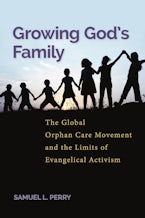Growing God’s Family
The Global Orphan Care Movement and the Limits of Evangelical Activism
Illustrates the hidden challenges embedded within the evangelical adoption movement.
For over a decade, prominent leaders and organizations among American Evangelicals have spent a substantial amount of time and money in an effort to address what they believe to be the “Orphan Crisis” of the United States. Yet, despite an expansive commitment of resources, there is no reliable evidence that these efforts have been successful. Adoptions are declining across the board, and both foster parenting and foster-adoptions remain steady. Why have evangelical mobilization efforts been so ineffective?
To answer this question, Samuel L. Perry draws on interviews with over 220 movement leaders and grassroots families, as well as national data on adoption and fostering, to show that the problem goes beyond orphan care. Perry argues that evangelical social engagement is fundamentally self-limiting and difficult to sustain because their subcultural commitments lock them into an approach that does not work on a practical level.
Growing God’s Family ultimately reveals this peculiar irony within American evangelicalism by exposing how certain aspects of the evangelical subculture may stimulate activism to address social problems, even while these same subcultural characteristics undermine their own strategic effectiveness. It provides the most recent analysis of dominant elements within the evangelical subculture and how that subculture shapes the engagement strategies of evangelicals as a group.
Contributor Bios
Reviews
"Perrys book is significant because it is one of the first to offer a clear window into evangelical activism from a rich sociological perspective. Perry is extraordinarily balanced in his analysis of both the strengths and weaknesses of evangelicals dominant approach to social engagement." ~ American Journal of Sociology
"This books central tenet about the saliency of branding a church that is attractive to racially diverse professional millennials leads to interesting research questions about the effectiveness of such strategies in other Chicago churches and churches around the nation... this book serves as a useful guide for how churches may approach attracting new members in a period of increasing racial diversity and declining worship attendance." ~ The Review of Religious Research
"Growing Gods Familyis about America as much as it is about evangelicals. Were do-gooders. We adopt orphans. We do other good things. And yet, our excessive individualism too often gets in the way. The result: we rush into rash ill-prepared activism. Growing Gods Family is marvelously well-researched and deeply disturbing." ~ Robert Wuthnow,Princeton University
"This fascinating case study deftly captures the authentic spirit of so many American evangelical 'movements' for change, explaining with empathetic and fair but brutally honest criticism why and how religiously motivated people and activism can prove in the end to be ironically self-undermining and ineffective. A valuable contribution to our sociological understanding of American evangelicalism and religious movements and culture." ~ Christian Smith,University of Notre Dame
"Growing Gods Familyis a strong, well-researched book, worthy of a wide academic and non-academic audience." ~ Sociology of Religion
 This work is licensed under a
Creative Commons Attribution-NonCommercial-ShareAlike 4.0 International License
(CC BY-NC-SA).
This work is licensed under a
Creative Commons Attribution-NonCommercial-ShareAlike 4.0 International License
(CC BY-NC-SA).


